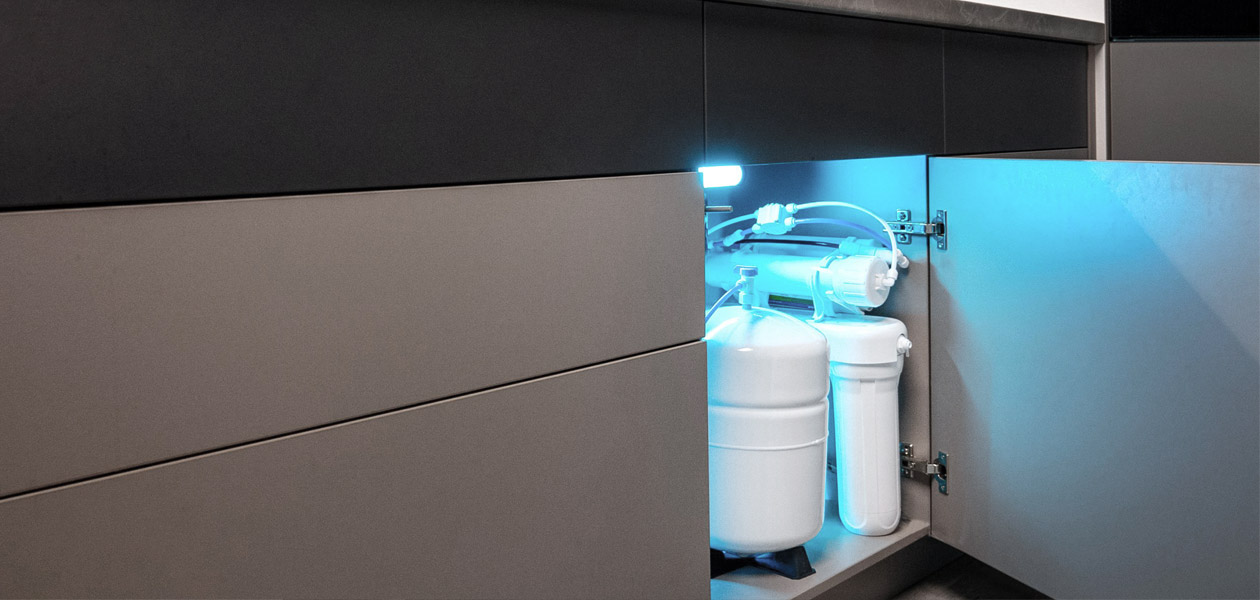Have you thought about what’s really in your tap water? Even though municipal water supplies must meet certain safety standards, they may still contain trace amounts of chemicals, minerals, and other impurities that can affect taste, odour, and potentially even your health. That’s where water filtration systems shine – they give you extra protection and ensure clean, refreshing water flows from your faucet.
Water filtration systems work like high-tech sieves, removing unwanted contaminants while leaving the good stuff behind. By having a water filtration system installed, you can expect a range of benefits:
- Better health: Reduce exposure to harmful contaminants for you and your family.
- Improved taste and smell: Enjoy crisp, delicious water that encourages healthy hydration.
- Environmental responsibility: Ditch single-use plastic bottles for a sustainable solution.
- Money savings: Save a bundle compared to the ongoing cost of bottled water.
Let’s explore these benefits in more detail – you’ll be surprised what a difference a high-quality water filtration system can make for your home and well-being!
In this guide:
- Health Benefits: Enjoy Cleaner Water, Support Your Wellbeing
- Improved Taste and Odour: Experience the Pure Difference
- Environmental Benefits: Make a Sustainable Choice for Your Home and Planet
- Cost Savings: Make a Smart Investment for Long-Term Value
- Additional Benefits: Enhance Your Home and Enjoy Convenience
- Get Your Fast Quote Today!
Health Benefits: Enjoy Cleaner Water, Support Your Wellbeing
While council water treatment systems do a fantastic job ensuring safety, trace amounts of contaminants can remain. These can include:
- Chlorine: Used for disinfection, but some studies suggest potential links to certain health concerns at high levels. A 2019 review published in the journal Environmental Health Perspectives found an association between long-term exposure to chlorinated drinking water and an increased risk of certain cancers. However, further research is needed to confirm a causal relationship.
- Lead: A heavy metal that can leach from old pipes and plumbing fixtures, leading to developmental problems in children and other health risks.
- Fluoride: While beneficial for dental health at recommended levels, excessive fluoride intake can cause dental fluorosis, according to the Centers for Disease Control and Prevention (CDC).
- Microorganisms: Bacteria and parasites occasionally slip through treatment processes, causing gastrointestinal illnesses.
Fortunately, water filtration systems can effectively remove these and other unwanted elements. Here’s how they contribute to improved health:
- Reduce Exposure to Contaminants: Filters physically trap or chemically bind to harmful substances like lead, chlorine, and some bacteria. A 2018 Desalination and Water Treatment study found that reverse osmosis filtration systems effectively removed lead from contaminated water, significantly reducing blood lead levels in study participants.
- Promote Healthy Hydration: Improved taste and clarity of filtered water often lead to increased water consumption, which is essential for overall body function and well-being.
- Potential for Improved Skin Health: Some studies suggest a link between chlorine exposure and dry, irritated skin. Filtering out chlorine may help alleviate these issues. For example, a 2014 study published in the International Journal of Dermatology found that showering with filtered water was associated with improved skin hydration and reduced roughness.
It’s important to note that the specific health benefits you experience will depend on your individual needs and the quality of your local council water supply. However, by removing or reducing contaminants, water filtration systems can be valuable in supporting your overall health and well-being.
Improved Taste and Odour: Experience the Pure Difference
Have you ever noticed a slight metallic or chlorine taste in tap water? These unpleasant sensations are often caused by impurities like minerals, chlorine, and even trace amounts of bacteria. Fortunately, water filtration systems effectively remove these culprits, leaving you with water that tastes as good as it is good for you.
So, how does filtration work its magic? Here’s a breakdown of how it tackles taste and odour issues:
- Chlorine Removal: One of the primary contributors to unpleasant taste and odour is chlorine, used by councils for water disinfection. Activated carbon filters, commonly found in many systems, effectively absorb chlorine, leaving your water fresh and odour-free.
- Mineral Reduction: Minerals like iron and manganese can also impact taste and odour, often leaving a metallic or earthy aftertaste. Sediment filters trap these particles, resulting in cleaner-tasting water.
- Organic Matter Removal: Trace amounts of organic matter occasionally contribute to unpleasant odours. Activated carbon filters, in addition to chlorine removal, also tackle these organic compounds, ensuring your water is pure and odour-free.
The benefits of enjoying better-tasting water go beyond pure satisfaction. Here’s how it can positively impact your daily life:
- Increased Hydration: When water tastes good, you’re naturally more likely to drink it. This is crucial for overall health, as proper hydration supports numerous bodily functions.
- Enhanced Beverage Experience: Whether you enjoy a refreshing glass of iced tea or a steaming cup of coffee, filtered water shines through the true flavours of your favourite beverages. Say goodbye to unwanted aftertastes and hello to a richer, more enjoyable drinking experience.
- Cooking with Confidence: The quality of your water can significantly impact the taste of your cooking. Using filtered water ensures your culinary creations are not affected by unwanted flavours or odours, allowing the natural ingredients to take centre stage.
Investing in a water filtration system is an investment in your taste buds and overall well-being. Enjoy the refreshing difference of clean, delicious water and experience the multitude of benefits it offers for your hydration, beverage enjoyment, and culinary adventures.
Environmental Benefits: Make a Sustainable Choice for Your Home and Planet
In today’s environmentally conscious world, every choice we make can contribute to a positive impact. Choosing a water filtration system is not just about personal health and taste; it’s also a responsible environmental decision. Here’s how water filtration systems benefit the environment:
Reduce Plastic Waste
The single-use plastic water bottle problem is a growing concern. Billions of plastic bottles are used and discarded yearly, contributing significantly to landfill waste and environmental pollution. By opting for a water filtration system, you can significantly reduce your reliance on bottled water, helping to:
- Minimise landfill waste: Each time you refill your reusable water bottle with filtered water, you eliminate the need for a single-use plastic bottle, contributing to a cleaner landfill environment.
- Reduce plastic production: By choosing filtration over bottled water, you indirectly influence the demand for new plastic bottles, potentially leading to decreased production and the associated environmental impact.
Potential Energy Savings
While water filtration systems require some energy to operate, they can be more energy-efficient than other water purification methods like boiling water. This is because:
- Boiling water uses significant energy: Heating large amounts of water on the stovetop or electric kettle consumes substantial energy, especially frequently.
- Filtration systems are often low-energy: Many filtration systems utilise minimal electricity to operate, primarily for pumping water through the filter. Additionally, some systems, like gravity-fed filters, require no electricity.
It’s important to note that the specific energy consumption of a water filtration system depends on its type and features. However, the general principle remains – opting for filtration over boiling water can contribute to a smaller energy footprint.
By choosing a water filtration system, you can enjoy cleaner, better-tasting water while making a responsible choice for the environment. You’ll reduce plastic waste, potentially lowering energy consumption, and contribute to a more sustainable future.
Cost Savings: Make a Smart Investment for Long-Term Value
While the initial purchase of a water filtration system may involve an upfront cost, it can be a wise investment that pays off in the long run. Here’s how:
Save Compared to Bottled Water
The cost of bottled water can add up quickly, especially for families who consume several bottles daily. The average cost of a 1.5L bottle of water in Australia can range from $1.50 to $3.00, depending on the brand and location.
The ongoing cost of operating a water filtration system is significantly lower. Consider the following:
- Filter replacements: Filter replacements typically range from $20 to $100 annually depending on the system and usage.
- Water usage: The actual water used for filtration is minimal and generally negligible compared to the cost of bottled water.
By performing a simple calculation, you can estimate the potential cost savings. For example, if a family of four consumes 2 litres of bottled water per day at an average cost of $2.00 per bottle, their annual expenditure would be approximately $2,920. Even considering the initial cost of a filtration system and annual filter replacements, the long-term savings compared to bottled water can be substantial.
Potential Savings on Appliances
Hard water, prevalent in some areas of Australia, can cause mineral buildup in appliances like kettles, coffee machines, and dishwashers. This buildup can reduce their efficiency and lifespan, potentially leading to higher energy bills and earlier replacements.
Water filtration systems help reduce mineral buildup, which can extend your appliances’ lifespan and save you money on repairs and replacements in the long run.
Investing in a water filtration system is not just about clean water – it’s about making a smart financial decision. By saving money on bottled water and potentially extending the life of your appliances, a water filtration system can offer significant value over time.
Additional Benefits: Enhance Your Home and Enjoy Convenience
Beyond the core benefits already discussed, water filtration systems offer several additional advantages:
- Reduced Limescale: Hard water minerals can leave behind a white, chalky residue called limescale on surfaces and appliances. Filtration helps minimize this buildup, keeping your faucets, kettles, and showers cleaner and sparkling. The Water Quality Association (WQA), provides further information on the impact of hard water on appliances and plumbing.
- Cleaner Clothes and Dishes: Hard water minerals can also reduce the effectiveness of soap and detergents in your washing machine and dishwasher. Filtered water allows these cleaning agents to work more effectively, resulting in cleaner clothes and dishes with less detergent needed. The American Cleaning Institute (ACI), offers resources on detergent effectiveness in various water conditions.
- Convenience and Ease of Use: Many water filtration systems are simple to install and require minimal maintenance, often involving only periodic filter replacements. Enjoy readily available clean water at your fingertips without the hassle of purchasing and storing bottled water.
These additional benefits add to the overall value proposition of water filtration systems, contributing to a more convenient, efficient, and enjoyable household experience.



